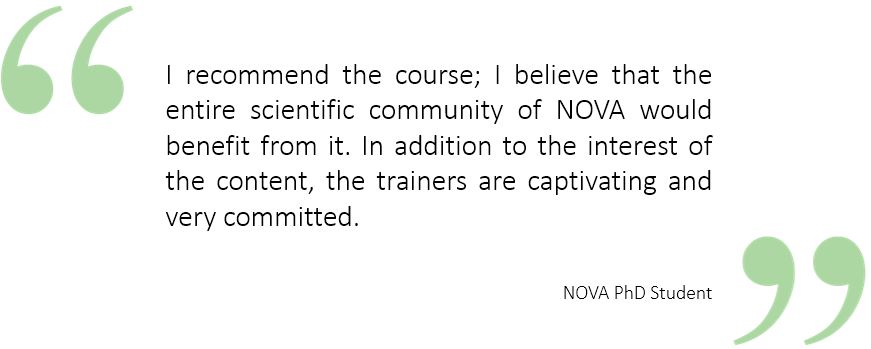

Members of the public are increasingly using online environments and specially social media platforms to find information about science. It is vital that scientists and scientific institutions start using those platforms to disseminate and promote their research activities. This 2-day course guides students through the communication process on the web and the importance of properly managing their online identity inside and outside social media. Using different platforms (weblogs, Facebook, Twitter, and other social media), students are invited to practice, and learn with the practice of others, their own communication skills. Our approach encourages the contributions based on a more empirical analysis of the effective use of social media by scientists, aiming to inspire the students to reproduce the best practices on the field.
SOCIAL MEDIA FOR SCIENTISTS COURSE SYLLABUS (PDF)
PhD students at Universidade NOVA de Lisboa.
PhD holders working at NOVA (researchers, teachers, ...)
(There are no currently scheduled editions of this course.)
(De momento, não há edições deste curso agendadas.)
António Granado, Assistant Professor NOVA FCSH
António Granado, Assistant Professor NOVA FCSH
Joana Lobo Antunes, Invited Assistant Professor NOVA FCSH
Sílvia Castro, Executive Director CMU Portugal Program
Students will be evaluated for two different exercises:
1. The writing of a post in a specially created weblog on science issues;
2. The curation of a specific science issue, using one of the tools presented during the course.
Lectures - 8 h
Practical exercises - 8h
Reading/self-study - 12h
By the end of the Curricular Unit the students will be able to:
Bik HM, Goldstein MC (2013). An Introduction to Social Media for Scientists. PLoS Biol 11(4): e1001535. doi:10.1371/journal.pbio.1001535
Powell , Douglas A, Casey J Jacob & Benjamin J Chapman (2012). Using Blogs and New Media in Academic Practice: Potential Roles in Research, Teaching, Learning, and Extension. Innovative Higher Education 37: 4, 271-282
Sanchez, Ana; Granado, António; e Lobo Antunes, Joana (2014). Redes Sociais para Cientistas. Lisboa: Nova Escola Doutoral – Reitoria da Universidade NOVA de Lisboa. ISBN: 978-989-20-5419-3.